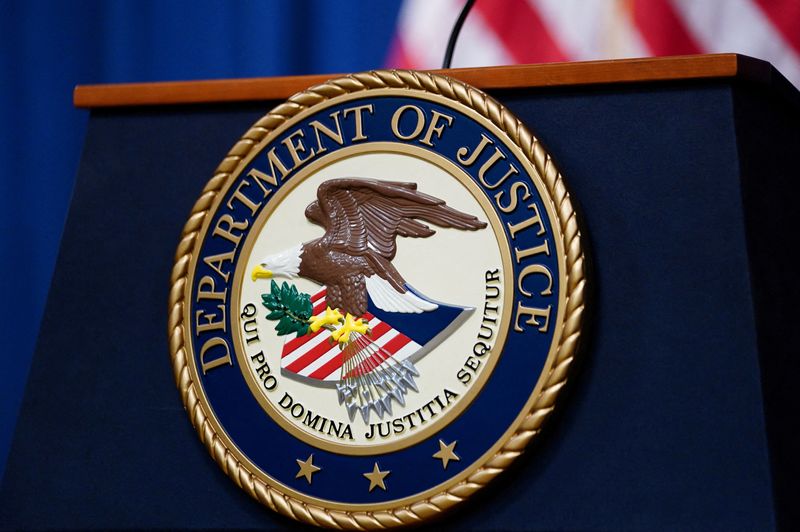Investing.com’s stocks of the week
By Tim Reid and Sarah N. Lynch
WASHINGTON (Reuters) - As Donald Trump hustles to build his cabinet, one job stands out: the attorney general who will support his agenda of mass deportations, pardoning Jan. 6 rioters and seeking retribution against those who prosecuted him over the past four years.
During the Republican U.S. president-elect's first term, he was infuriated by what he called an obstructive Justice Department, including attorneys general Jeff Sessions, who allowed a probe into alleged contacts between the 2016 Trump campaign and Russia, and Bill Barr, who publicly refuted his false claims his 2020 election loss was the result of fraud.
Trump and his transition team aim to build a Justice Department packed with loyalists after he is sworn in on Jan. 20. Mark Paoletta, a conservative attorney leading the planning, has already warned career department employees to be ready to support Trump's agenda or possibly lose their jobs.
Vice President-elect JD (NASDAQ:JD) Vance said in an October interview with ABC that the choice of attorney general would be Trump's most important pick, a job second in importance only to the president.
The broad contours of Trump's plans for the Justice Department have been communicated through his public comments, statements by Paoletta and in interviews and public forums with former department attorneys.
Federal prosecutors will likely be directed to prioritize illegal immigration cases. Cities that hope to receive a slice of the department's more-than-$291 million justice assistance grant program will likely have to agree to cooperate with federal immigration enforcement.
The Civil Rights Division is expected to shift its focus away from police accountability toward defending religious freedom and filing legal challenges against government and private sector diversity, equity and inclusion programs.
Legal experts said Trump's pledge to use the Justice Department to go after his political enemies could undermine the impartiality of career prosecutors and shatter norms of prosecutorial independence, which were reinforced after the Watergate scandal and the 1974 resignation of Republican President Richard Nixon.
Bradley Moss, an attorney specializing in national security law, said the combination of a politicized Justice Department and a July U.S. Supreme Court ruling that presidents have broad immunity from criminal liability for official acts would give Trump great leeway.
"Donald Trump is coming into power for a second time armed with experience, with a chip on his shoulder and armed with a Supreme Court ruling on immunity," Moss said. "He is going to bend and twist and push the boundaries of presidential power anywhere and everywhere he wants to."
RETRIBUTION, REVENGE
Trump sounded warnings throughout his campaign, telling supporters in 2023, "I am your retribution." More recently, he has toned down his language, saying several times this year that his revenge would be "success."
A Trump transition team spokesperson did not respond to a request for comment for this story.
A range of people have been under consideration for attorney general, including Missouri Attorney General Andrew Bailey; former Securities and Exchange Commission Chairman Jay Clayton; Robert Giuffra, an attorney with Sullivan & Cromwell; U.S. Senator Mike Lee and Matthew Whittaker, who briefly served as acting attorney general during Trump's first term, according to sources familiar with the discussions.
"The Department of Justice is committed to ensuring an orderly and effective transition to the new Administration," a department spokesperson said.
On the campaign trail, Trump spoke openly about seeking retribution against those he says persecuted him during his 2017-2021 White House term.
The list of targets he has pledged to investigate or prosecute include Democratic President Joe Biden and his family; Manhattan District Attorney Alvin Bragg, who secured criminal convictions of Trump over charges stemming from a hush money payment to a porn star; Special Counsel Jack Smith, who led two federal prosecutions against Trump that are now being wound down, and members of the congressional committee that investigated the Jan. 6, 2021, U.S. Capitol riot by Trump supporters trying to overturn his election defeat.
Trump has said Republican former congresswoman Liz Cheney, a harsh critic of his false claims of 2020 election fraud, should be tried for treason and that Mark Milley, the former chairman of the Joint Chiefs of Staff, should be executed.
He has called for the prosecution of both New York Attorney General Letitia James, whose civil fraud case against The Trump Organization resulted in penalties of $364 million, and Arthur Engoron, the judge in that case.
Steve Bannon, a former Trump White House adviser, referenced Bragg, James and Smith on Tuesday as he left a New York criminal court, telling reporters: "The hunters are about to become the hunted."
Mark Zaid, an attorney representing government workers, said he has received dozens of calls a day from former and current government officials worried about a second Trump term.
Zaid said he has advised a small number of them to take trips abroad around the Jan. 20 Inauguration Day and to stay overseas for at least two weeks to gauge how serious Trump is about exacting revenge.
"They keep saying they are going to retaliate and Trump says he is going to fulfill all his promises," Zaid said.
